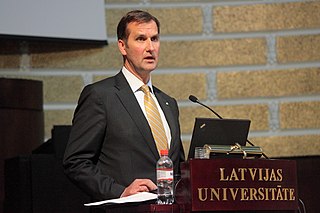
The politics of Latvia takes place in a framework of a parliamentary representative democratic republic, whereby the Prime Minister is the head of government, and of a multi-party system. The President holds a primarily ceremonial role as Head of State. Executive power is exercised by the government. Legislative power is vested in both the government and parliament, the Saeima. The Judiciary is independent of the executive and the legislature. The Economist Intelligence Unit has rated Latvia as "flawed democracy" in 2017.

The Constitution of Latvia, ratified on February 15, 1922, contains a provision regarding one of the reserve powers of the President of Latvia to initiate the dissolution of the parliament. According to Article 48-50 of the Constitution,

Parliamentary elections were held in Latvia on 7 October 2006. The governing coalition, led by Prime Minister Aigars Kalvītis and his People's Party, won the election. Kalvitis's government thus became the first to be re-elected since Latvia had regained independence in 1991.

Ingrīda Latimira, formerly Ingrīda Ūdre, is a Latvian politician who belongs to the Latvian Farmers' Union political party.

Aivars Endziņš is a Latvian lawyer and politician. He graduated from the University of Latvia in 1968 and in 1977 attained a candidate of legal sciences degree. In 1997 he became a Doctor of Jurisprudence. He has worked as a lecturer at the University of Latvia and at the Turība School of Business Administration. He was a member of the Communist Party of the Soviet Union from 1963 to 1990, when he became a member of the Popular Front of Latvia and a member of the Supreme Council of the Republic of Latvia. He was for a short time a member of Latvian Social Democratic Workers' Party, and in 1993 became a member of Latvian Way. He was a member of the 5th and 6th Saeimas, but resigned in 1996 to become a judge on the Constitutional Court of Latvia. He became the Chief Justice of the Constitutional Court in 2000 and left this office in 2007. He was a presidential candidate in the 2007 Latvian presidential election, nominated by Harmony Centre and supported by the New Era Party and the political alliance For Human Rights in a United Latvia. After a passionate debate over his membership of the Communist Party, which included a revelation that in the 1970s he had denied the occupation of Latvia, he lost the election to Valdis Zatlers.

The President of Latvia, is head of state and commander-in-chief of the National Armed Forces of the Republic of Latvia.

A constitutional referendum to amend the constitution of Latvia in order to allow one-tenth of the total registered electorate to initiate a popular referendum to dissolve the Latvian parliament was held in Latvia on 2 August 2008.

Parliamentary elections were held in Latvia on 2 October 2010. It was the first parliamentary election to be held in Latvia since the beginning of the economic crisis during which Latvia had experienced one of the deepest recessions in the world.

Parliamentary elections were held in Latvia on 6 October 2018.
For a Good Latvia was a Latvian right-wing party alliance founded on 22 April 2010 by the People's Party, Latvia's First Party/Latvian Way, the businessmen's movement For a Good Latvia and some smaller parties. The initial name (AŠ)² referred to the initials of the party leaders of the People's Party and LPP/LC. Both major parties participating had been doing badly in the polls. It was often regarded as the oligarchs' bloc of the Latvian politics. The bloc itself was headed by former Latvian president Guntis Ulmanis. In the 2010 parliamentary election it won a disappointing 8 seats and did not join the governing coalition. In July 2011 the People's Party was dissolved and Ainārs Šlesers' LPP/LC renamed itself the Ainars Šlesers LPP/LC Reform Party, by analogy with the Zatlers' Reform Party. The parliamentary faction of "For a Good Latvia", however, continued to exist until the end of the 10th Saeima and was headed by Edgars Zalāns. In the elections of September 2011, Ainars Šlesers LPP/LC Reform Party failed to win any seats.

Indirect presidential elections were held in Latvia on 2 June 2011. Incumbent president Valdis Zatlers was standing again, as well as Andris Bērziņš, a former head of SEB Unibanka ; Bērziņš was nominated by five Saeima members of the Union of Greens and Farmers just two days before the nomination deadline, although the party was assumed to back Zatlers for reelection.

A referendum on whether the Saeima should be dissolved early was held in Latvia on 23 July 2011. President Valdis Zatlers used his parliamentary dissolution power for the first time in the history of Latvia. A "yes/no" vote was held and the referendum passed with 94.3% support.

Andris Bērziņš is a Latvian businessman and politician who was President of Latvia from 2011 to 2015. Bērziņš was the President of Unibanka from 1993 to 2004. He was elected as President by the Saeima on 2 June 2011.

The Reform Party, until April 2012 known as Zatlers' Reform Party, was a centre-right political party in Latvia founded by former President Valdis Zatlers on 23 July 2011. It won 22 seats in the Saeima in the 2011 election.

Early parliamentary elections were held in Latvia on 17 September 2011, following the country's first parliamentary dissolution referendum held on 23 July 2011. The previous parliamentary election was only held in October 2010.

Edmunds Sprūdžs is a Latvian politician and businessman, a former Minister for the Environmental Protection and Regional Development of Latvia. He is member of the Reform Party.

Laimdota Straujuma is a Latvian economist who was the Prime Minister of Latvia from January 2014 to February 2016. Before her tenure as Prime Minister, she served as Minister of Agriculture from 2011 to 2014. She was the first woman to serve as the head of government of the country. After her resignation on 7 December 2015 she announced her intention to resume a seat in the Saeima.

Inese Lībiņa-Egnere is a Latvian lawyer and politician representing the political party Unity. She was a member and Deputy Speaker of the 11th Saeima. Currently is the Deputy Speaker and the Chairperson of the National Security Committee of the 12th Saeima.























